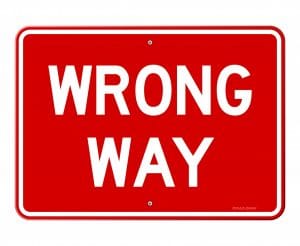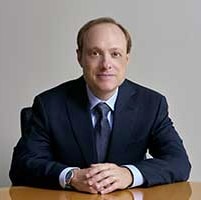Wrong-Way Crashes Cause Many Fatalities
 It seems a no-brainer – don’t drive down a one-way street in the wrong direction. Don’t drive on any road where the traffic is coming towards you. Driving the wrong way generally means you’re destined to have a head-on crash with any of the cars coming towards you. Head-on crashes on any Chicago road are often deadly. Survivors often suffer catastrophic injuries such as traumatic brain injuries, spinal cord damage, amputations, burn injuries, broken bones, internal injuries, and other types of permanent injuries.
It seems a no-brainer – don’t drive down a one-way street in the wrong direction. Don’t drive on any road where the traffic is coming towards you. Driving the wrong way generally means you’re destined to have a head-on crash with any of the cars coming towards you. Head-on crashes on any Chicago road are often deadly. Survivors often suffer catastrophic injuries such as traumatic brain injuries, spinal cord damage, amputations, burn injuries, broken bones, internal injuries, and other types of permanent injuries.
According to the National Transportation Safety Board (NTSB), on average, there are about 260 wrong-way collisions each year, causing 360 deaths each year. The numbers were fairly steady for each of the six years in the study. Per a NTSB report on studies regarding wrong-way crashes:
- A Virginia study fought that wrong-way crashes found that the death rate for wrong-way crashes is 27 times higher than other types of highway crashes.
- A California Department of Transportation study found that the fatality rate for wrong-way accidents is 12 times more deadly than other highway crashes.
- A Michigan study found that more than one in five wrong-way crashes are fatal as compared to .3 percent for other types of highway collisions.
More than 50% of the drivers traveling the wrong way were between the ages of 20 and 30. The numbers were much better for drivers in their 30s, 40s, 50s, and 60s. Drivers in their 70s were 2.5 times more likely to cause a deadly crash if they were driving in the wrong lane as compared to the correct lane, and drivers in their 80s were 30 times more likely to cause a fatal crash if they were driving in the wrong lane instead of the correct lane.
CBS 2 News also states that wrong-way collisions are on the rise here in Illinois, going from 991 in 2020 to 1,140 in 2021. And, they report, “The same is true specifically in Chicago. IDOT received reports for 305 wrong-way crashes in 2020, and 376 in 2021.”
The article reports several fatal crashes along Lake Shore Drive, noting “The majority of the crashes on the Drive were in Lincoln Park, South Chicago, and Hyde Park.” They also state that the numbers of wrong-way accidents continue to trend upward.
The primary reason drivers end up in the wrong lane
According to the NTSB, the main reason drivers end up going the wrong way is because they enter an exit ramp. Other reasons include “Making a U-turn on the mainline or using the emergency turnaround through the median (recovery maneuver after missing an exit ramp). Most wrong-way collisions occur in the lane closest to the median.”
Most wrong-way driving occurs at night when it’s difficult to see. More than 3/4 of fatal wrong-way crashes occurred between 6 pm and 6 am. Most fatal wrong-way crashes occurred on the weekend.
Alcohol and wrong-way driving
Alcohol impairment was a major cause of these fatal car accidents. Nearly 60% of the 1,566 accidents that were studied involved alcohol impairment. This 60% is significantly higher than the 6.5% rate of accidents that NTSB studied involving drivers traveling in the correct/right direction.
States provide that the standard blood alcohol limit (BAC) for charging someone with driving under the influence of alcohol is .08. The NTSB study found that of the 60% (1,150) drivers who were alcohol-impaired while driving in the wrong direction – 10% had a BAC of between .08 and .15. and 59% had a BAC of more than .15. The rest of the alcohol-impaired drivers had a BAC under .08.
Nine percent of the drivers in the NTSB study who were driving the wrong way had been convicted of a DUI within the prior 3 years – compared to “3.2 percent for a matched control group of right-way drivers.”
For young drivers, alcohol was the major factor for driving the wrong way.
Elderly drivers and wrong-way accidents
For drivers in their 70s and 80s, other causes contributed to the deadly wrong-way driving statistics. Some of the likely reasons older drivers operate their vehicle the wrong way on a one-way street or on the wrong side of a highway include:
- Poor vision
- Cognitive disabilities
- Physical changes
- Non-familiarity with GPS systems
How can more wrong-way collisions be avoided?
The NTSB offers the following corrective measures:
- Installing ignition interlock devices (IIDs). Since alcohol impairment is a major factor in fatal wrong-way accidents, IIDs for drivers who have one or more DUI convictions should be considered by states. An IID requires that the driver test his/her BAC level before the car can start and at random intervals during the car’s operation.
- The use of passive devices. These include seatbelts and airbags. Newer technology may even recognize if a driver is under the influence of alcohol without the driver having to blow into a device.
- Efforts to monitor older drivers. Some states require that older drivers take road safety exams instead of having their license automatically renewed. Most states allow a senior’s doctor to notify the state department of motor vehicles if the doctor thinks the patient shouldn’t drive due to dementia or for other reasons.
- Identifying drug impairment. Drugs, in addition to alcohol, are another cause of wrong-way collisions. Prescription medications should be clearly marked if driving can be affected.
Other suggestions for reducing highway deaths due to driving the wrong way or in the wrong lane include:
- Better highway signs and pavement markings
- Better ramp and interchange designs
- Better state monitoring of wrong-way driving
- More law enforcement intervention including better procedures for alerting wrong-way drivers and maneuvering them off the road
- Better technology such as new car software that can monitor when a car is traveling the wrong way which prompts the software to warn the driver or even force the driver off the road
There’s no excuse for driving the wrong way. At Gainsberg Injury and Accident Lawyers, P.C, our experienced Chicago car accident lawyers work aggressively to hold wrong-way drivers accountable for any deaths and injuries they cause. We also seek to hold any other responsible people liable such as the owners of the vehicle and any businesses that sold liquor to a minor or to someone who was visibly intoxicated. To speak with lawyers who have been fighting for Chicago residents for 20+ years, call us at 312.600.9585 or fill out our contact form to schedule an appointment.

Attorney Neal Gainsberg has spent the last 20+ years fighting to protect the rights of the injured in Chicago and throughout Illinois. For dedicated legal help with a personal injury, car accident, or wrongful death matter, contact Gainsberg Injury and Accident Lawyers in Chicago for a free consultation.
